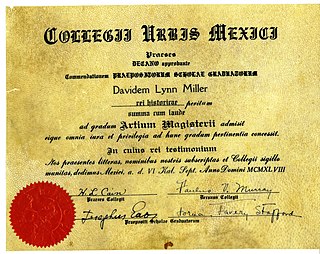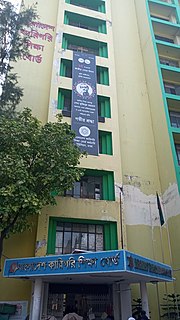Related Research Articles

A community college is a type of educational institution. The term can have different meanings in different countries: many community colleges have an "open enrollment" for students who have graduated from high school. The term usually refers to a higher educational institution that provides workforce education and college transfer academic programs. Some institutions maintain athletic teams and dormitories similar to their university counterparts.

Vocational education is education that prepares people to work as a technician or to take up employment in a skilled craft or trade as a tradesperson or artisan. Vocational education is sometimes referred to as career and technical education.

A diploma is a certification, deed, or document awarded by an educational institution testifying the recipient has graduated by successfully completing their courses of studies. Historically, it has also referred to a charter or official document of diplomacy.

A vocational school is a type of educational institution, which, depending on the country, may refer to either secondary or post-secondary education designed to provide vocational education or technical skills required to complete the tasks of a particular and specific job. In the case of secondary education, these schools differ from academic high schools which usually prepare students who aim to pursue tertiary education, rather than enter directly into the workforce. With regard to post-secondary education, vocational schools are traditionally distinguished from four-year colleges by their focus on job-specific training to students who are typically bound for one of the skilled trades, rather than providing academic training for students pursuing careers in a professional discipline. While many schools have largely adhered to this convention, the purely vocational focus of other trade schools began to shift in the 1990s "toward a broader preparation that develops the academic" as well as technical skills of their students.
An institute of technology is an institution of tertiary education that specializes in engineering, technology, applied science, and natural sciences.

Education in Portugal is free and compulsory until the age of 18, when students usually complete their year 12. However, only one of those requirements is necessary. The education is regulated by the State through the Ministry of Education. There is a system of public education and also many private schools at all levels of education. The first Portuguese medieval universities, such as the University of Coimbra, were created in the 13th century, and the national higher education system is fully integrated into the European Higher Education Area.

Education in Bangladesh is overseen by the country's Ministry of Education. The Ministry of Primary and Mass Education is responsible for implementing policy for primary education and state-funded schools at a local level. In Bangladesh, all citizens must undertake ten years of compulsory education which consists of five years at primary school level and five years at high school level. Primary and secondary education is financed by the state and free of charge in public schools.
Education in Kenya refers to the education system in Kenya.

Education in Rwanda has undergone considerable changes throughout Rwanda's recent history, and has faced major disruptions due to periods of conflict. Despite improvements to education and literacy as part of the country's rebuilding after the 1994 genocide, the education system still faces challenges including low school enrolment rates and limited resources. The education system is overseen by the Ministry of Education.
The Secondary School Leaving Certificate is a certification obtained by a student on successful completion of an examination at the end of study at the secondary schooling level in India. The SSLC is obtained on passing the grade 10 public examination, which is commonly referred to as 'class 10 board examinations' in India. SSLC is a common eligibility examination popular in many states in India, especially Kerala, Karnataka, and Tamil Nadu.
The Higher Secondary Certificate (HSC) is a public examination credential in Bangladesh, India, and Pakistan. HSC is equivalent to GCE A Level in England and 3rd and 4th year of high schools in the United States.
The Diploma in Engineering or Diploma in Technical Education is a program focused on practical and skills-oriented training. It is a technical course that only covers the essentials when ranked with an undergraduate engineering degree. It aims to provide students with industry or job related engineering knowledge, scientific skills, computing and analysis, mathematical techniques, a sound knowledge of English to communicate in the field and ability to apply problem-solving techniques.
In Uzbekistan, secondary education is divided into two stages. The first stage includes nine years of compulsory schooling with the same programs all over Uzbekistan. The second stage covers education and vocational training after nine years. It includes general secondary education and specialized secondary education. Young people receive general secondary education while staying in school for the tenth and eleventh grades. Upon successful completion, they get a Certificate of Complete Secondary Education.
Sylhet Polytechnic Institute or SPI is a state supported technical academic institute located in Sylhet, Bangladesh. It was established in 1955 by the then East Pakistan government. It was named as Sylhet Polytechnic Institute in 1959.
The Department of Technical Education (DTE) is a higher education governance body under the government of Kerala, India. It is a part of the higher education department and is managed by the Minister of Education. The department advises the government on matters dealing with higher education. It manages the working and activities 9 government engineering colleges, 3 aided engineering colleges, 49 polytechnic colleges, three colleges of fine arts, 39 technical high schools, 17 government commercial institutes, 42 tailoring and garment making training centres and four vocational training centers.
In Pakistan, the Diploma of Associate Engineer or DAE is a three years post-secondary program of instruction in various engineering disciplines. It includes regular studies with classroom lectures, workshop assignments, laboratory experiments, industrial projects and industrial tours.

The Bangladesh Technical Education Board is a state regulatory board responsible for monitoring and developing technical and vocational education in the secondary level (SSC), 2-year higher secondary level (HSC/Vocational), 4-year Diploma in Engineering degree and 4-year Diploma in Medical Technology degree throughout the People's Republic of Bangladesh. The board sets the curriculum, develops learning materials, grants affiliation to technical and vocational institutions, governs admissions, conducts examination, and awards diploma certifications.

The West Bengal State Council of Technical & Vocational Education and Skill Development(Bengali: পশ্চিমবঙ্গ রাজ্য কারিগরি ও বৃত্তিমূলক শিক্ষা এবং দক্ষতা উন্নয়ন পর্ষদ) (Bengali: পশ্চিমবঙ্গ রাজ্য বৃত্তিমূলক শিক্ষা ও প্রশিক্ষণ সংসদ) is a statutory body under the West Bengal state government for administration and examining vocational courses in West Bengal. The courses are offered from various affiliated institutions, including Higher Secondary, Secondary Schools and Polytechnic Colleges across the state. Its headquarters are in Karigori Bhavan in Kolkata.

Rangpur Polytechnic Institute is a technical educational institution in Rangpur, Bangladesh. It was established in 1968. It provides four year Diploma in Engineering Degree. Student who passed secondary school can enroll for studying Diploma in Engineering. After successfully completing four year Diploma in Engineering Degree student can apply for jobs where they will work as a Sub-Assistant Engineer. Rangpur Polytechnic Institute is one of the most popular polytechnic institute in Bangladesh.

Dinajpur Polytechnic Institute located in Dinajpur, Bangladesh is a largest and reputed Government polytechnic institute in Bangladesh which was established in 1964. This polytechnic has controlled by the Government of Bangladesh and under the Bangladesh Technical Education Board (BTEB).